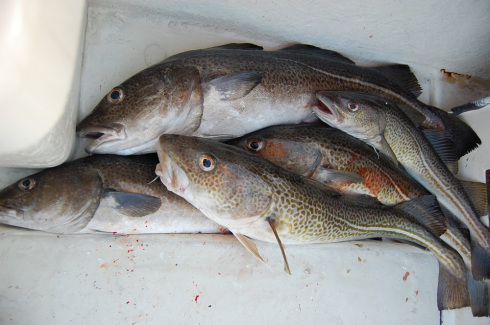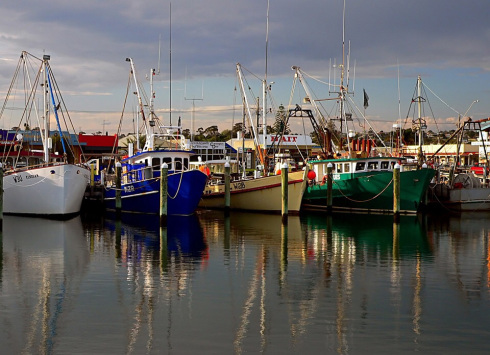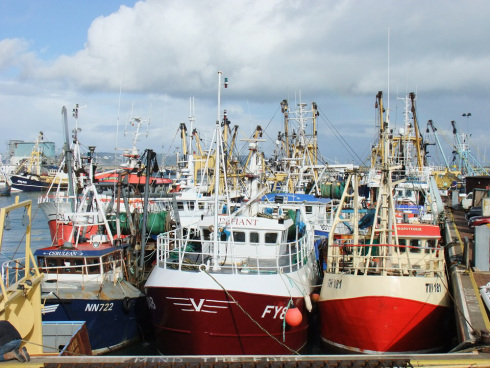Whilst the Angling Trust is remaining neutral over the vexed question of whether or not Britain should remain a member of the European Union in deference to the wide variety of views held by our members there are many of us with a track record of fighting for fishing who believe that it is vital that our marine fisheries are managed in cooperation with our neighbouring countries. One such person is former Fisheries Minister and Angling Trust Ambassador Richard Benyon MP and I’m delighted to reproduce his thoughtful article here.
Personally I’ve long been a supporter of Britain’s membership of the EU. And, putting aside the overwhelming economic case for remaining in an institution that has helped deliver an unprecedented period of peace and prosperity, there are reasons why we as anglers should remind ourselves of how the EU has delivered many important protections for fish and wildlife. Cleaner rivers, improved sewage discharge standards, better bathing beaches, habitats and water framework directives – there is a long list of environmental achievements that have come from Brussels rather than Westminster.
That’s why I was pleased to be invited with Richard Benyon and other wildlife and environmental campaigners to attend the launch of Environmentalists for Europe – E4E- headed up by Stanley Johnson, the former MEP and father of Boris (who takes a somewhat different view!)

Environmentalists for Europe was launched earlier this year in Westminster.
You can find E4E on Facebook or check out the website here: http://www.environmentalistsforeurope.org/
Anyway…have a read of what Mr Benyon has to say …
Fisheries: Facts not Fantasy by Richard Benyon MP
I am not surprised that the Brexit campaign have made fisheries their poster boy. The failures of the old Common Fisheries Policy are an easy hit. It was not the EU’s finest hour. But a closer look shows the weakness of the highly simplistic arguments and downright inaccuracies of the ‘leave’ campaign.
They would have us believe that if only we could throw off the shackles of EU mismanagement and bureaucracy our brave fisherfolk can harvest plentiful seas freed of pesky foreigners. No. Not true.
Most of the comments I have heard about the evils of the CFP tend to come from the mouths of those unaware of recent significant reforms in fishery management. Reforms that were promoted by British Ministers and officials and agreed unanimously by all EU countries. A British Government successfully leading a popular reform agenda in Brussels. Under these reforms European waters will no longer be micromanaged from Brussels. Fisheries will be (are, in some areas already) managed by countries that fish a particular sea basin. Fishermen and scientists will be in control of saying what quantities of each stock can be harvested. The ghastly practice of throwing away perfectly edible fish is banned for most species and all countries in Europe are signed up to a legal requirement to fish sustainably. As I told the Prime Minister after the successful conclusion of our reform negotiations in 2011, “you see, you can reform the EU’.

North Sea cod stocks are recovering thanks to EU quotas and, as Richard Benyon argues here, we can’t manage highly migratory species like bass and herring on the basis of national boundaries. Fish don’t read maps!
As Fisheries Minister I sometimes had to remind people that beyond our inshore waters there are relatively few species that hang around in one part of the sea. They might spawn in one country’s waters and shoal in another’s. Fish operate in ecosystems not according to lines on maps. In the case of North Sea Herring for example, most of the juveniles live in the south east corner around the German bight, whereas the adults tend to congregate around the Shetland Isles prior to spawning at various sites along the British coast. Cod are found throughout the North Sea but prefer spawning along the border between UK and Norwegian waters.This is important when you consider the complex network of bilateral arrangements that would have to be agreed if we left the EU.

Commercial fisherman like to claim they are feeding the nation but in fact the UK fleet exports 45% of its catch. 80% of that quantity goes to EU countries. For example 90% of fish landed in Ramsgate are sold in the Boulogne Fish Market
Never mind “Project Fear”, “Project Fact” is needed here. The UK exports 45% of its catch. 80% of that quantity goes to EU countries. For example 90% of fish landed in Ramsgate are sold in the Boulogne Fish Market – for 15% more in value than they would get at home. When you visit North East Scotland you see vast European registered refrigerated trucks driving south and many don’t stop until they reach France or Spain. UK fishing vessels fish in the waters of other EU countries. In addition to wider sovereign waters fishing rights UK fishermen have rights within the 6-12 mile limit of four other member states: Ireland, Germany, France and the Netherlands. For example trawlers out of Brixham exploit the valuable scallop stocks in the Baie de Seine. Trawlers out of Peterhead fish in Dutch and German waters. Many of the foreign vessels fishing in UK waters do so because the companies that own them bought from UK fishermen and with them the right to fish. It is important to note that the UK is allocated about 30% of the EU’s total catch even though it has only 13% of the total sea area (ie the UK EEZ compared to the entire EU EEZ, but not including territorial waters).

UK fishing vessels have rights within the 6-12 mile limit of four other EU member states: Ireland, Germany, France and the Netherlands. Trawlers out of Brixham exploit the valuable scallop stocks in the Baie de Seine. Trawlers out of Peterhead fish in Dutch and German waters. It is important to note that the UK is allocated about 30% of the EU’s total catch even though it has only 13% of the total sea area.
In a post Brexit world what would “taking back control of our fisheries” really mean? Some suggest it would mean an end to quotas. No. Quotas would still be needed to regulate the quantity of fish landed. Would it mean an end to regulations on net sizes and engine emissions? Well, perhaps if a truly ignorant Government was elected that did not care a damn about the health of our seas, our environment or the future economic value of fisheries and the communities they support.
I have been a vocal critic of the pre reform CFP but it is simplistic to blame it for all the woes of the fishing industry. Professor Callum Roberts of York University has produced a graph of cod stocks in the North Sea. It shows a steep decline since the late 19th century. There are only two periods when cod stocks rose: 1914-1918 and 1939-1945. I’ll leave you to work that one out. There is not even a blip in the descending line at the time the UK joined the CFP. The truth is that our technical ability to harvest fish on an industrial scale has improved every decade and successive Governments’ ability to regulate the industry effectively has always been behind the curve. The absurd centralised nature of the CFP just made the problem worse – as did sea temperature rise, acidification and other environmental factors.
The ironic fact is that the “leave” campaign’s use of fisheries to support their case has come at a time when the future is starting to look bright for our fishing industry. Certain stocks are rising. North Sea cod has been one of the success stories of reformed EU management, showing strong recovery in the last few years and now approaching a healthy stock size for the first time in decades. Other stocks show signs of improvement. Our commitment with our EU partners to manage our fisheries to Maximum Sustainable Yield will deliver the increased biomass of fish that has so long been wished for. “Leave” offers our fishing industry only uncertainty and a myopic view of how to manage a complex environment. As Professor Roberts puts it, “The stocks of many species in UK waters have improved considerably with the reform of the CFP. The signs are positive”.
Richard Benyon is MP for Newbury and was Minister for the Natural Environment and Fisheries from 2010-2013
One Response to “Fisheries Facts and the EU”
John Atkins
June 1, 2016 at 9:22 am
Yes! Those scientific facts are indisputable but we can do all that out side of the EU with out all the extra administration associated with present EU policies and the weekly thousands we pay in subs for just being a member state. On balance it is better out than in and Richard Benyon is not a deep sea trawler man earning his living by catching fish.













